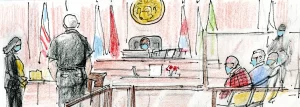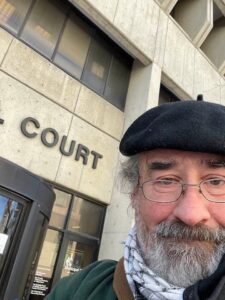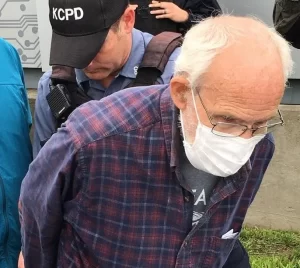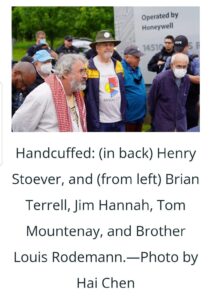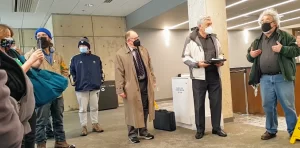Judge tells nuke resisters, ‘Continue to fight for what you believe is right’
by Christopher Overfelt
The trial for four of the five line-crossers from last year’s demonstration at the Honeywell nuclear weapons plant in south Kansas City, Missouri took place on February 18. The four men on trial were Tom Mountenay, Brian Terrell, Louis Rodemann, and Jim Hannah. The fifth line-crosser, Henry Stoever, will be tried separately on February 23.
The four defendants February 18 were voluntarily arrested for trespassing at the National Security Campus, operated by Honeywell for the National Nuclear Security Administration. The Honeywell plant makes or procures 80-85 percent of all the non-nuclear parts needed for America’s nuclear arsenal. The four men were participating in nonviolent, direct action in accordance with their beliefs that nuclear weapons pose a direct threat to the planet and to humanity. As one of the defendants so eloquently stated, “Why are we on trial and not those who make these weapons?”
Around 30 supporters of the defendants joined them in the courtroom in downtown Kansas City. The presiding judge was Ardie A. Bland. After brief testimony from Lt. Michael Clark, the security officer from the Honeywell plant, the defendants stated their pleas of not guilty, and then the sentencing part of the trial began. During this part of the trial, the defendants were allowed 5 minutes each to state their cases to the court.
All of the defendants expressed the deep feeling of a religious duty that compelled them to this action. Brian Terrell, the first testifier, talked about being part of the Catholic Worker movement in his home state of Iowa. He said he had been a part of the Catholic Workers since he was seventeen years old. “I was there practicing my religion,” he said, “and part of my defense is based around the Religious Freedom Restoration Act passed by Congress in 1993.” He concluded his statement with the idea that the only real enforcement mechanism of foreign policy around the world is us, the people. “People like you and me,” he said. “We had a moral obligation to be at the Honeywell plant that day.”
The second testifier, Tom Mountenay, echoed the sentiment of religious obligation to be at the plant. He referenced Romans 10, which states love does no wrong. “Love is the fulfillment of the law,” he said. “I was taking a step of love towards a future with justice and without war. We can learn together the way towards peace.” He also spoke about his late wife, Lu Mountenay, and the inspiration he draws from her. Lu had herself been arrested at the Honeywell plant in the past, and had in fact been on trial in front of the same judge, Ardie Bland.
The third testifier was Jim Hannah. Jim gave impassioned testimony covering many topics related to nuclear weapons, including their dangers, their illegality, and the immoralities involved in their production. “We must abolish nuclear weapons,” he said, “or they will abolish us.” He also referenced a higher court where we will all be judged. He referred to Deuteronomy 30:19 in his defense. “I call heaven and earth to witness against you today that I have set before you life and death, blessings and curses. Choose life so that you and your descendants may live.”
The last testifier was Brother Louis Rodemann, a long-time activist in the Kansas City community. Brother Louis is 82 years old, and as a young man dedicated his life to peace and nonviolence in the Congregation of Christian Brothers. “How are there so many poor among us in a country so rich?” he asked the court. He cited the military budget and the fact that 53 percent of all US discretionary spending goes to war. “We need to wean ourselves from a culture of war to a culture of human need. No more citizens lacking food and healthcare. Our country stands indicted, guilty and immoral. How can I not oppose these weapons?”
Judge Bland, of course, had the final say. He voiced support for the defendants in his sentencing statement. He talked about his own personal hero, Dr. Martin Luther King, Jr., and how non-violent civil disobedience had paved the way for himself to have wider opportunities. “These are the hardest types of cases to judge over,” he said, “because they cover many thoughts and ideas. It is before these cases that I take the time to pray and ask for the right direction.”
The judge mentioned that he agrees with the idea of a court of a higher power. “While in the eyes of the law you are guilty,” he said, “I recognize that there is a higher power compelling you to act. I encourage you to follow that compulsion and continue to fight for what you believe is right.” The judge asked the defendants to pray for him and the rest of the justice system. He handed out a 180-day suspended sentence to defendants, with no jail time to be served. “It has been an honor to have you all in my courtroom,” he said. “I can tell you are the kind of people that actually care about others.”
xxx
‘Crimes against humanity are being committed at the NSC,” says Brian Terrell
by Brian Terrell
On February 18, I was one of four defendants in Kansas City, Missouri Municipal Court, on trial for allegedly trespassing at the “National Security Campus,” a sprawling facility of the National Nuclear Security Administration of the US Department of Energy, where most of the non-nuclear components of the new line of “more precise and deployable” US nuclear weapons are being produced.
Judge Ardie Bland had no comment on codefendant Jim Hannah’s observation in his closing statement, “It’s sadly ironic that the protesters are on trial, while the perpetrators are protected,” but the judge was clearly taken by Jim’s reference to “two higher courts for recourse—the court of global humanity, and the court of Divine justice,” neither of which, Jim is convinced, would find us guilty regardless of the judgement of the court hearing our case that day. “More likely,” Jim said, “they would judge us wanting if we had done nothing.”
In finding us guilty, Judge Bland admitted that he does have to answer to a higher court, but in the court where he was presiding that day, he was required to judge us according to the law. The law that informed his ruling, though, was not the statute under which we were charged nor the laws of the United States or of the State of Missouri. These were largely ignored and would have found us not guilty had they been applied. Along with the municipal court where we sat and the courts of global humanity and of Divine justice, there is another court, one that cannot be named but that seems to take jurisdiction in any case where the military industrial complex is challenged, a secret, pervasive court that makes a mockery of every human institution, that has no time for constitutional amendments or acts of congress or international treaties but must ensure above all else that the profligate and profitable production of weapons never be impeded, even at the risk of destroying all life on the planet.
The city’s case established that the NSC is a federal government facility that is unfenced and its entrance is unguarded and open except when it is known that a protest is planned. The only disruption of business or traffic on the day in question was caused by the decision by federal authorities to exclude a peaceful protest. While the ordinance defines trespass as when a person “knowingly enters unlawfully or knowingly remains unlawfully,” Judge Bland ruled that at issue was strictly whether we were present at the date and place as alleged or not. Any other testimony in our defense regarding what we were doing there or what we know was ruled inadmissible.
In closing arguments, which do not count as evidence, Judge Bland allowed each of us to briefly say our peace and when it was too late to make a difference, he did listen respectfully. The First Amendment “right of the people peaceably to assemble, and to petition the Government for a redress of grievances” as applied to our gathering was not considered, nor were our reasonable beliefs that the building of new nuclear weapons is illegal and that crimes against humanity are being committed at the NSC.
Judge Bland’s lenient and creative sentence, our post-trial conversation with him and his appeal for our prayers were genuine and our trial was a deeply human encounter in a venue where too often “justice” is churned out cruel and cold. It would be an overstatement, though, to say that justice was done. Even if it were not a condition of probation, I will be praying for Ardie Bland.
The prosecution’s one witness, a lieutenant for the plant’s “federal protection” force, testified that the National Security Campus was open for business on May 31, a federal holiday, because, he said, “the job never ends.” The “job” has got to end or it will be the end of us.
xxx
‘I cannot NOT resist the immorality’ of producing weapons of war
By Louis Rodemann
Christian Brother Louis Rodemann made this statement during his February 18 trial for civil resistance at the Kansas City National Security Campus May 31, 2021. The judge sentenced him to pray for the judge and judicial system, and to keep protesting.
My name is Louis Rodemann; I am 82 years old. I am a member of a religious order in the Catholic Church named Christian Brothers. As a member of this community, I have made vows to live my life in a certain way. All of my adult life I have been engaged in a ministry which serves special needs: a high school for students of poor working families; a high school for students who had been expelled or dropped out of previous schools; a Catholic Worker House which served breakfast and dinner to the poor and homeless in Midtown KC, and a shelter for homeless families with children. All of this was done by a small volunteer staff living in community, and hundreds of other volunteers from the KC area.
In addition to providing these services to this at-risk population, we felt called to educate about, call to attention, advocate for and protest against systems, structures and institutions which contributed significantly to the poverty and disenfranchisement of the people we were committed to serve. How and why was there such disabling, dehumanizing poverty in the United States, arguably the most powerful and richest country in history? How was this overwhelming power and wealth distributed? One of the answers pointed overwhelming to our military industrial complex. Over half, 53% of the US discretionary budget is allocated to the plans and preparation for war, our carrying out these plans, and addressing the long-term physical and mental effects of our veterans.
Every budget is a moral document! Under this criteria, our country, the United States of America stands indicted: sinful, guilty, immoral!
It was in this context that I, the community I lived with, along with others, added another vow to our way of life: the vow of nonviolence. Its practitioners take the love and example of Jesus as the basis for this vow. It is meant to permeate a person’s whole way of life. In part it reads:
by striving for peace within myself and seeking to be a peacemaker in my daily life;
by refusing to retaliate in the face of provocation and violence;
by persevering in nonviolence of tongue and heart;
by living conscientiously and simply so that I do not deprive others of the means to live;
by actively resisting evil and working nonviolently to abolish war, the weapons of war and the causes of war from my own heart and from the face of the Earth.
It is living in fidelity to the last element of this vow of nonviolence that brings me, once again, to face this court today. To live true to my life stance, I cannot not nonviolently resist the immorality of the plans and production of the weapons of war, which is the sole purpose of the thousands of persons employed at the National Security Campus located at 14520 Botts Road in south Kansas City.
What if we decided to wean ourselves from our national war culture and shifted equivalent resources to address the drastically unmet human needs? We could adequately undo poverty: none of our citizens hungry, homeless, lacking healthcare, child care and education.
xxx
“The protesters are on trial while the perpetrators are protected,” Jim Hannah tells court
by Jim Hannah
Here’s the statement Jim Hannah prepared for the trial of himself and three other defendants February 18 in the Kansas City, Missouri Municipal Court. Time allowed for Jim to share most of his points. The charge: trespass at the National Security Campus, where parts for nuclear weapons are made and procured. The sentence: Pray for the judge and judicial system, and keep protesting!
I plead not guilty today out of my conviction that the guilt here is not on the part of myself or my co-defendants. The true guilt is on the part of the policies and the producers creating nuclear weapons of indiscriminate mass destruction. It’s sadly ironic that the protesters are on trial, while the perpetrators are protected.
To me, nuclear weapons are a clear and present danger—to humanity and to all life on Earth. As President Kennedy told the United Nations in 1961: “Today, every inhabitant of this planet must contemplate the day when this planet may no longer be habitable. Every man, woman and child lives under a nuclear sword of Damocles, hanging by the slenderest of threads, capable of being cut at any moment by accident or miscalculation or by madness. The weapons of war must be abolished before they abolish us.”
I’ve lived my entire life, nearly 75 years, under that nuclear sword—a sword upheld by threads that grow more frayed each passing year as more nations acquire nuclear weapons, and those weapons are made ever more deadly. Sadly—tragically—humanity has never been closer to the brink of nuclear annihilation than it is today. The hands of the Doomsday Clock created by the repentant atomic scientists of the Manhattan Project are now set at 100 seconds to midnight, the closest we’ve yet come to the likelihood of global catastrophe, through a deadly concoction of nuclear weapons, climate collapse, and disruptive technologies. (The Doomsday Clock was begun in the year I was born, 1947. It was first set at seven minutes to midnight.)
As a long-time advocate of peace and nonviolence, I view my witnesses at the National Security Campus with PeaceWorks Kansas City as an alarm bell atop the Doomsday Clock. These actions are intended as a wake-up call. This to me is little different from seeing smoke coming from a house and sounding the alarm. In such a case, would it be illegal to break down the door to save human life? No matter what the letter of the law might be, would anyone argue about what the spirit of the law would require? Surely saving human life would take precedence over legalities.
Regardless of the outcome of today’s proceedings, in actuality I plead my case to two higher courts for recourse—the court of global humanity, and the court of Divine justice. It is my conviction that neither of these courts would find me or my co-defendants guilty for witnessing against nuclear weapons. More likely, they would judge us wanting if we had done nothing.
Few in the US seem to realize that most nations already deem nukes immoral, even illegal. A Treaty on the Prohibition of Nuclear Weapons has been in effect for the past year after it was signed (in 2017) by nearly two-thirds of the United Nations’ 197 member states. That treaty commits the ratifying nations to “never under any circumstances … develop, test, produce, manufacture, otherwise acquire, possess or stockpile nuclear weapons.” Even the threatened use of nuclear weapons is prohibited, in the name of humanity. Sadly, the United States is not a signatory of the Treaty, but instead is engaged in a renewed nuclear arms race toward inevitable catastrophe. In Kansas City alone, some billion dollars a year is being spent on the US nuclear weapons arsenal, employing 6,000 people—a colossal misdirection of human and financial resources that could instead be invested in efforts that would affirm life, rather than confer death.
The second court in which I think I and my co-defendants would be found not guilty is the Supreme Court of a Higher Power. When, this January, the Treaty on the Prohibition of Nuclear Weapons observed the first-year anniversary of its entry into force, more than 170 faith communities from around the world (including the denomination I serve in ministry) released a joint interfaith statement that read, in part, “We speak with one voice to reject the existential threat to humanity that nuclear weapons pose. … As people of faith, we believe that the possession, development, and threat to use nuclear weapons is immoral. … We invite everyone to join us in this work for peace, justice, and respect for life—against which nuclear weapons stand in complete opposition.” (orepa.org)
Thousands of years ago the author of Deuteronomy could well have been speaking to our day with this invitation from Moses: “I call heaven and earth to witness against you today that I have set before you life and death, blessings and curses. Choose life so that you and your descendants may live.” (Deut. 30:19, NRSV) Yes! Choose life!
Martin Luther King saw decades ago that we either eliminate nuclear weapons or they will eliminate us. Yet so many today seem oblivious to the horrific destructive power of nuclear weapons—even just one accidental detonation, for instance. I recall the massive explosion in Beirut, Lebanon, in August, 2020. The blast was caused by the detonation of 3,000 tons of ammonium nitrate illegally stored in the city’s harbor. It killed 218 people, wounded 7,000, and displaced 300,000 residents.
In the two years since the blast, a recurring question in Beirut has been, “Who knew what and when about these hazardous materials during the nearly six years they were illegally stored here?” I can imagine a similar question being raised if Kansas City were to be destroyed by a nuclear detonation. A single average-size,10-megaton warhead (equivalent to 10,000 tons of dynamite) would dwarf the impact of the Beirut blast. Foremost among the questions survivors might well ask is, “Why didn’t somebody warn us that hosting a key element in production of the US nuclear arsenal would make us a prime target?” That’s a good question for all Kansas Citians to ask and answer. Another question might be, “Who ever told us deterrence would work?” And my favorite question all along has been, “Are nukes good for the grandkids?”
Such good questions; so few good answers. Why don’t more people ask why? I think denial accounts for much of it. Who wants to think the unthinkable, or speak the unspeakable? But a few weeks ago my wife and I did just that. We went to Union Station to see the Auschwitz exhibit, commemorating the site where Nazi Germany murdered more than a million souls, cremating an average of one thousand daily. Looking at the horrific photos—including tons of human hair and thousands of victims’ shoes—I had a recurring question of disbelief: How could those living nearby have ignored the smell of burning flesh? For that matter, how could an entire nation fall under the spell of Nazism? And why didn’t more people speak up, or do something, anything? The closest thing offered in answer to that question was in the exhibit’s closing video, which talked about a culture of hatred and violence that normalized The Final Solution.
I fear our nation is similarly embracing a culture of hatred and violence, clinging to nuclear weapons of mass extinction that will one day be recognized as crimes against humanity. Chemical and biological weapons of mass destruction are already banned by the global family, with the exception of outlaw nations. Is that what the United Sates has become by the nuclear sword we dangle over the world—a nation feared for our ability to rain down unfathomable death and destruction, deliverable 24/7 by land, by sea, and by air?
We here in Kansas City are especially complicit. Ironically, the same city that hosts the Auschwitz exhibit also hosts the National Security Campus. If even a hundred of the some 12,000 nuclear warheads in the world’s arsenals are detonated, the immediate effects of the blasts and radiation that would kill hundreds of thousands outright would be followed by a nuclear winter projected to kill most, if not all, of humanity. This would be a Holocaust of all holocausts, a Final Solution for civilization, and Earth as we know it.
In my mind, this is not hyperbole. Hyperbole, it seems to me, is claiming nuclear weapons as defensive deterrents keeping us safe, when in actuality they are offensive provocations making the whole world unsafe. They threaten all humanity with the terror of indiscriminate mass destruction. They prompt a renewed nuclear arms race now underway. And they entice even more nations to join the exclusive nuclear club as a matter of national pride or self-defense. It’s truly MAD-ness, Mutually Assured Destruction—not just genocidal, not just suicidal, but in truth omnicidal—the destruction of life as we know it on planet Earth.
This is a power that should be entrusted to no nation or person. So that’s why some members of PeaceWorks Kansas City engage in nonviolent peace witnesses, with 150 arrests at the nuclear weapons plant in the past 12 years. I am among them. I also write letters to the editor, lobby legislators, write and photograph for PeaceWorks, and express my views for nuclear abolition among friends and via social media. But sometimes speaking up needs to be coupled with standing up. So I cross the line in symbolic resistance to the National Security Campus, which I have dubbed the Global Insecurity Factory. It manufactures not the things that make for peace, but nuclear weapons that, even if never used, have already brought untold illness and death in their production and testing.
I plead “not guilty” today because I do not want to be guilty of turning a blind eye or a deaf ear to the evil of nuclear weapons. As a person of faith, I am reminded of the teaching of Apostle Paul, who urges followers of Jesus to be “ministers of a new covenant, not of letter but of spirit; for the letter kills, but the Spirit gives life.” (2 Cor. 3:6) I consider myself innocent of wrongdoing in the spirit of the law, yet recognize I am not above the letter of the law. I am willing to accept the finding of the court and meet its requirements. Thank you, your honor, for your consideration, and for the opportunity to express my concerns. All that we hold dear in the Constitution and the Bill of Rights could this very hour be destroyed in a nuclear fireball in which, as the poet warns, “all are cremated equal.”
I rest my defense.
xxx
by Tom Mountenay
Defendant Tom Mountenay made this statement to Judge Ardie A. Bland on February 18, 2022, in Kansas City, Missouri Municipal Court. After being convicted, Tom was sentenced to pray for the judge and the judicial system and continue to work for peace.
I am grateful for the opportunity to speak and share that my intent when crossing the line was to protest—in a nonviolent way—nuclear weapons. On May 31, 2021, Memorial Day, I crossed a line at the National Security Campus. I chose that site purposely, because that is where the United States makes 80 percent of the parts for nuclear weapons. All weapons of war are to kill the enemy; nuclear weapons kill everyone and everything. Even the making of nuclear weapons kills.
Before I crossed the line I explained why and said, “I am taking a simple step, an act of love, towards a future when there will be no weapons of war, as prophesied by Isaiah.”
Since childhood, my church taught, and I believe the prophesy of Isaiah 11 verse 6:
The wolf shall live with the lamb,
the leopard shall lie down with the kid,
the calf and the lion and the fatling together,
and a little child shall lead them.
In my latter years as a minister for Jesus, I meditate and practice trying to live an ethic of a nonviolent life. I have coined a term, horizon love, which I try to live by loving, dreaming, and living in the present towards a future, not yet seen, beyond the horizon, where war will be no more.
One ethic of love found in Romans 10:13 states: Love does no wrong … therefore, love is the fulfilling of the law. I appreciate that our nation allows us to practice our diversity of religions as we try to learn the ways towards peace.
My wife Lu Mountenay, now deceased, appeared before your honor. She was a rebel, arrested four times in seeking justice. If Lu had an opinion, she not only voiced it; she did something about it. Lu was her true self when holding a mic or a blowhorn, leading a march or a rally with words of encouragement and challenge. Lu spoke proficiently about the poison of nuclear waste and the threat of nuclear weapons. She served on the board for PeaceWorks Kansas City, editing newsletters and writing news stories.
Before her death, I vowed to continue her support for PeaceWorks.
So it is in the spirit of love that I will try to live PeaceWorks’ core truth: peace works! And I will imagine and strive for a healthy world of justice & peace without war and its weapons.
